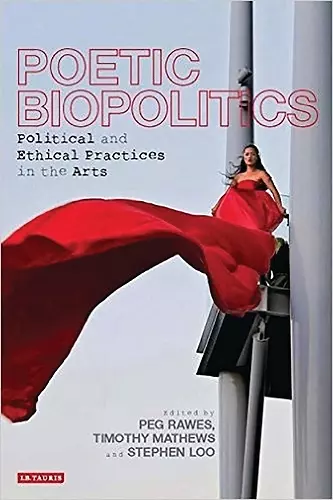Poetic Biopolitics
Practices of Relation in Architecture and the Arts
Timothy Mathews editor Peg Rawes editor Stephen Loo editor
Format:Hardback
Publisher:Bloomsbury Publishing PLC
Published:6th May '16
Currently unavailable, and unfortunately no date known when it will be back

Poetic Biopolitics is a positive attempt to explain and show how the often destructive effects and affects of biopolitical power structures can be 'poeticised' and deconstructed through the arts and humanities.
As the French philosopher and social theorist Michel Foucault defined the concept, 'biopolitics' is the extension of state control over both the physical and political bodies of a population. Poetic Biopolitics is a positive attempt to explain and show how the often destructive effects and affects of biopolitical power structures can be deconstructed not only critically but poetically in the arts and humanities: in architecture, art, literature, modern languages, performance studies, film and philosophy. It is an interdisciplinary response to the contemporary global crisis of community conflict, social and environmental wellbeing. Structured in three parts - biopolitical bodies and imaginaries, voices and bodies, and social and environmental turbulence - this innovative book meshes performative and visual poetics with critical theory and feminist philosophy. It examines the complex expressions of our physical and psychic lives through artefact, body, dialogue, image, installation and word.
'Despite the importance of space, distance and the emergence of relations in Foucault's original theory of biopolitics and in Agamben's later theory of the entire Western tradition as marked by biopolitical thresholds, there has been far too little sustained work on the poetic dimensions of biopolitics, with even less attention paid to the original sense of poiesis as a bringing into being of an object distinct from praxis. In this wonderfully edited collection of essays from a wide range of scholars, the concept of biopolitics is enriched and intensified by exploring the ways in which various arts reconfigure life, the polity and its intimate but complex relations. This book will be valuable for scholars in architecture, cultural theory, contemporary aesthetics, and anyone with an interest in one of the most difficult but intriguing concepts of twenty-first century thought.' - Claire Colebrook, Edwin Erle Sparks Professor of English, Penn State University, 'This is a profoundly optimistic and energizing book - a collection or collective of fascinatingly diverse, attentive chapters working together to examine the many "expressions of positively differentiated life" and singing out for the vital part aesthetic practices play in producing relations between bodies and spaces, opening out newly affirmative ways of thinking, conversing, making, writing and living.' - Kate Briggs, Assistant Professor in Comparative Literature and English, The American University of Paris, 'Despite the importance of space, distance and the emergence of relations in Foucault's original theory of biopolitics and in Agamben's later theory of the entire Western tradition as marked by biopolitical thresholds, there has been far too little sustained work on the poetic dimensions of biopolitics, with even less attention paid to the original sense of poiesis as a bringing into being of an object distinct from praxis. In this wonderfully edited collection of essays from a wide range of scholars, the concept of biopolitics is enriched and intensified by exploring the ways in which various arts reconfigure life, the polity and its intimate but complex relations. This book will be valuable for scholars in architecture, cultural theory, contemporary aesthetics, and anyone with an interest in one of the most difficult but intriguing concepts of twenty-first-century thought.' - Claire Colebrook, Edwin Erle Sparks Professor of English, Penn State University
ISBN: 9781780769127
Dimensions: 236mm x 164mm x 34mm
Weight: 980g
328 pages